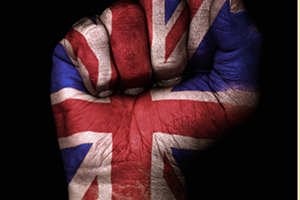International
Anarchy in the UK?

After the Brexit vote and a new British prime minister, history professor Laura Beers talks UK politics.
As the old saying goes, the sun never sets on the British Empire. Yet the United Kingdom recently turned inward, with the Brexit vote for a planned withdrawal from the European Union shocking the international community. The consequences are already evident, as the vote roiled financial markets and ignited a political firestorm that led to the resignation of British Prime Minister David Cameron.
With plenty of unanswered questions about the UK’s cloudy future, American University history professor Laura Beers can provide some answers. An expert on modern Britain, Beers talked with University Communications about Brexit, UK politics, and the daunting challenges awaiting new Prime Minister Theresa May.
“I don’t think much good is going to come of Brexit. I think it’s going to plunge the economy into recession in the medium term. In the long term, we will see,” says Beers.
Why They Voted “Leave”
Amidst the recent handwringing, critics accuse the pro-Brexit UK voters of applying self-inflicted economic wounds. Beers says that the referendum exposed both immigration fears and class divisions.
“There was a large anti-immigrant sentiment. But I don’t think that everyone who voted Brexit was xenophobic or racist,” she says. “De-industrialization has taken place in Britain on an even more rapid scale than it has in the United States, and there are a lot of displaced, former blue collar workers who are angry at the establishment. It’s not dissimilar to the Trump phenomenon. And Brexit was a chance to kick the man.”
“EU Light” and Implementation
Theresa May is a Conservative Party veteran and former home secretary, known for her competence and steely resolve. Beers views her not as a centrist, but a traditional conservative in the mold of Cameron. Though May had opposed Brexit, she’s clearly stated that she’ll respect the will of the voters and implement an EU withdrawal. The question is what shape Brexit will take.
One possibility is an “EU Light,” where the UK would maintain access to the European market, allow free movement of people, and still officially leave the EU. “EU Light” might be a tough sell politically, Beers says.
“That will be seen as a real defeat by many in the right wing of her party, who wanted a much harder Brexit and wanted to close borders. And May, for all of her conciliatory talk over the past couple of weeks, has been really tough on immigration,” she says.
Another option is if the UK could keep access to the single European market, but still restrict the free movement of people. Beers doesn’t consider this a workable policy. “I think the idea that you’re going to get access to markets without immigration is sort of pie-in-the-sky thinking.”
Devolution in the UK
Observers have speculated that Brexit could lead to the break-up of the United Kingdom, and the referendum has laid bare some of the regional divisions over European integration. Voters in England and Wales supported Brexit, while majorities in Northern Ireland and Scotland opposed it. One fear is that Scotland—which had a failed referendum for independence in 2014—would leave the UK so it could maintain membership in the EU.
Yet Beers has her doubts about that possibility. “In order for a state to join the EU, all the EU member states have to say ‘Yes.’ And Spain has explicitly said they would veto such an application, because they’re concerned about the Basque Country and separatist movements within Spain. Other countries could have similar concerns,” she says.
What might happen instead, she says, is Scotland will try to stay in the UK while independently remaining in the EU. “Essentially to have part of the United Kingdom leave the EU and part remain,” she adds. “There are a lot of messy scenarios that we could see play out moving forward.”
Labour Dysfunction
Despite Conservative Party missteps and Cameron’s resignation, the Labour Party was unable to reap the benefits and now has a leadership battle on its hands.
Beers is a Labour history specialist, and she expounded on the party’s Brexit struggles. Many parliamentary Labour Party members were ideologically committed to remaining in the EU, but Labour leader Jeremy Corbyn’s allegiances weren’t so clear, she says. Corbyn nominally opposed Brexit, but he’s been a globalization skeptic and his support for the “remain” forces was muted.
“There was a feeling within the parliamentary Labour Party that that was a kind of betrayal. Both of the ‘remain’ campaign, but also of an opportunity to capitalize on the divisions within the Conservative Party,” she explains.
Part of this stems from Labour’s own identity issues and lack of direction. “Historically, the Labour Party was not actually in power for very much of the 20th century,” she says. “It’s been more a coalition of opposers, a coalition of anti-conservatives, than a unified party with its own ideas about an alternative Britain.”
The More Things Change…Beers has a new book coming out this October on Ellen Wilkinson, a Labour MP and Britain’s second-ever female cabinet minister.
She sees parallels between that research and contemporary UK politics. The Labour Party in the 1930s was internationally-minded, grappling with the rise of European fascism. The Labour Party of today is still debating its “relationship with Europe, and whether the party should be internationalist or some kind of small, inward looking, little England party.”
As May becomes the second female British prime minister, she owes a debt to trailblazers like Wilkinson. “[Wilkinson] did make certain trade-offs. She never married, never had children, and basically married herself to politics,” Beers explains.
May—who is married but has no children—has already had to address the couple’s fertility issues. It’s a subject, Beers suspects, a male political leader would never have to broach. “We can just look at the way things have—and haven’t—changed over the past half century.”

